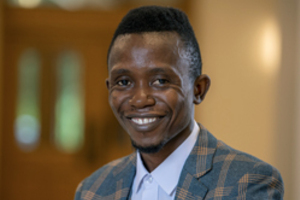
Researcher. Scholar. Author. Peacebuilder. Melvin Sharty, a second-year MGA student from Sierra Leone, highlights his research background on post-conflict Sierra Leone, his recent internship experience with River Phoenix Center for Peacebuilding in Florida, and the evolution of his peacebuilding journey.
What motivated you to research the impact of youth in peacebuilding?
As a young person whose childhood was interrupted by the decade-long civil war in Sierra Leone, I felt the impact of the civil war and wanted to get involved. My involvement in youth peacebuilding research took off in 2018 when I participated in a study supported by the United Nations for Young Peacebuilders (UNOY). UNOY conducts research on youth civic engagement activities in Sierra Leone. With UNOY, the research was not just talking to my fellow peers about what they’re doing to build peace in Sierra Leone, but also about what I can do. It was a defining moment for me to not just interview people, but to find myself in the process. I wanted to be more than a researcher; I wanted to be a peacebuilder.
What role does youth play in peacebuilding? What impact do they have and how can they participate?
Youth play different roles, like entrepreneurship, small business owning, advocacy, and holding governments accountable. Young people use different means to build peace in post-conflict Sierra Leone. A lot of young people are deciding that, instead of engaging in activities that are not meaningful, they will go to school. That, in itself, is peacebuilding.
Why did you choose the international peace studies concentration within the Master of Global Affairs?
Before UNOY, I wasn’t involved in peacebuilding activities. I was more strictly focused on human rights while working with an NGO. After UNOY, I wanted to switch roles from being a researcher to being a peacebuilder on the ground. I was excited to come to a program that can afford me the opportunity to grow in my specialization of knowledge, as well as practice key peacebuilding concepts and theories.
What was your internship experience like?
I was matched to the non-profit organization River Phoenix Center for Peacebuilding in Florida and, remotely, to the Religions for Peace in New York. In my internship, I explored the intersection of community and international peacebuilding. RPCP takes the approach of addressing conflict and violence through prevention, intervention, and restorative strategies involving the general public. I like that they took on the preventative angle in peace work. For Religions for Peace, the fact that they use an interfaith approach to engage communities worldwide is a way to prevent violence. I liked digging into the art of community-based peacebuilding. It is really an exciting experience where you’re contributing to your host organization’s work through researching, experimenting, and building professional relationships.
How do you think your internship experience will aid you in your future career steps?
My internship experience has prepared me not only to understand how to lead, manage, and implement a comprehensive peacebuilding program, but how to be compassionate, vulnerable, honest, and ethical. We can have all the hard skills, but if we lack compassion, empathy, and vulnerability, we cannot transform relationships. The most important takeaway from my internship was the relationships I built and the ability to see humanity embodied in the leaders I worked with. I will carry that with me as I search for jobs - I will use empathy and compassion to promote peace.
How have you changed since arriving here for the program? What is the biggest shift for you?
When I came to the Kroc Institute, I had this vision that I would come and study how to build peace. Now, it’s a movement. Someone said to me that peacebuilding is not a destination, it is a journey. For me, I’m discovering myself, who I am, what my vision of myself is, and what I will do with this vision after the program. I now focus on leading with empathy, even with those who disagree with me or are different from me.
Tell us something about yourself that isn’t on your resume - what do you want people to know about you?
I have written a fictional novel for primary readers in Sierra Leone. It is titled “A Gift for Failure” and my hope is to show all of us what it truly means to be human. The novel is set in a post-conflict community in Sierra Leone, where the Catholic Church is trying to provide education for young boys who were child soldiers or orphans from the civil war. The novel focuses on a 13-year-old boy navigating home and school challenges, and at the end of the school year, he fails. Instead of rejecting the child, his mother embraces him. That is a message for all African parents: it is okay to fail. Whenever we fail, we still have opportunities to make it better.
I am planning to get it published after graduation this spring.